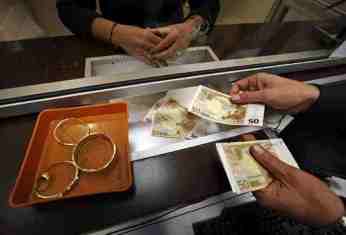Koreans’ gold donations – a model for Greeks?
Koreans donated billions of euros’ worth of family gold jewelry to help pay down their nation’s IMF debt , once, on 1997. a debt Korea paid off ahead of schedule. Is this an example for Athens? Might this also work for Greece?
“The core idea is quite right,” said economist Rolf Langhammer, who was vice president of the Kiel Institute for the World Economy during the Asian crisis “We need to transfer funds from the private sector to the state, so the state can meet its obligations.”
Though, “the situation is not quite the same” R.L. explained on DW, noting that Greece’s current problem, in contrast to that of Korea in 1997, doesn’t involve a shortage of foreign exchange reserves.
The diffence with the Greeks, to be exact, is that no one of the folk actually did rob this country, or cheated the international monetary organisations to enter the Eurozone. Greeks entered the most bleeding session of their modern history, being introduced form the very first moment of the crisis , also, a chaotic and non-comprehending situation of What this crisis was, Who caused it and Why ,and What could be done. Plus, day-to-day, the European reality makes it more obvious to the Greek soul, that the Eurozone for which all these sacrificies are gone , in the name of the Euro, doesn’t seem to give a dumm on what human pain is. Does not even seem to understand what humanitarian means .
This is the rucial core, for the Greeks, of understanding or not, begging on a nation’s knees in the name of the Euro, or not.
Most of the Greeks today, would like to hear an alternative scenario
 A Parliameary commitee of experts is tasked the previous days by Alexis Tsipras governmenet to asses whether previous governments upheld the interests of the Greek people by signing two agreements with the European Commission, European Central Bank and International Monetary Fund pledging austerity measures in exchange for bailout funding.
A Parliameary commitee of experts is tasked the previous days by Alexis Tsipras governmenet to asses whether previous governments upheld the interests of the Greek people by signing two agreements with the European Commission, European Central Bank and International Monetary Fund pledging austerity measures in exchange for bailout funding.
The commitee has requested the examination of four political periods that led to now, putting George Papandreou, Lucas Papademos, Antonis Samaras and Evangelos Venizelos in the spotlight.
- October 2009 – May 2010 : the signing of the first loan agreement by the then Prime Minister George Papandreou.
- May 2010 – November 2011: the signing of the second loan agreement.
- November 2011 – May 2012: the PSI restructuring of Greek debt (during which many Greek small bond-holders took major losses) under the administration of Lucas Papademos.
- May 2012 – January 25 – The handling of the debt crisis by the Venizelos – Samaras coalition government.


You must be logged in to post a comment.